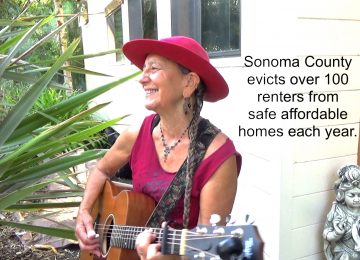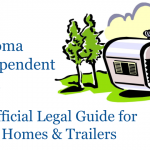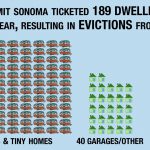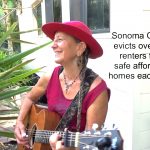Tomorrow afternoon, September 27, Supervisors will, for the first time ever, consider a change in policy that would allow some of the more than 10,000 low income renters on private rural property to remain in their safe, affordable trailers and tiny homes without fear of eviction from county code enforcement.
The Sonoma Independent urges citizens who care about affordable housing, and our neighbors who live in trailers and tiny homes, to let Supervisors know that we need real reform. Housing advocates are asking anyone who is able to join the zoom meeting or attend in person. A full list of Sonoma County supervisors and their contact information is at the bottom of this article. The alternative housing item will be heard in the afternoon after the break for lunch, around 1:00 a.m. The meeting agenda can be downloaded here and the specific agenda item can be found here.
Join us in urging supervisors to make these historic changes to building code enforcement and policy:
1) Create a new class of temporary housing for trailers and tiny homes
2) Legalize waterless composting toilets
3) Permit a “hold and haul” option for wastewater disposal, allowing thousands of people living in trailers to remain there without being attached to septic systems for wastewater, which is un-permitable for many property owners.
Last year, Permit Sonoma issued 30-day orders forcing property owners to evict about 189 rent-paying tenants, many of them seniors, out of the only safe housing they could afford in the county, for lack of unobtainable or prohibitively expensive permits.
The supervisors now have an opportunity to stop many of these evictions. Legalizing waterless toilets, creating a new class of temporary housing, and allowing “hold and haul” wastewater disposal are some of the building code changes which will be put before the board on Tuesday. While these and other changes will not protect all of the people living in alternative housing, they are the most substantial policy shifts to be considered in the yearlong effort to keep people in their tiny homes and trailers.
Even though this opportunity is promising, it remains to be seen whether the Supervisors will take action, or whether they will preserve the current status quo. Lynda Hopkins has been a champion for alternative housing and will almost certainly vote for the changes. Susan Gorin and David Rabbitt have also expressed the desire for policy shifts to protect renters, but it is unclear how far this support will go. Vice Chair James Gore and Supervisor Coursey have been more cautious in stating their positions about the issue, and it appears from his previous statements that Coursey at least may not support safe alternative housing.
Tomorrows meeting is the culmination of a year long effort by local housing activists and the Sonoma Independent. The issue was brought to light when Copperwoman Saso, a Sebastopol area grandmother, was forced to move from her state of the art tiny home by order of Permit Sonoma. Copperwoman wrote this song about the situation, which was viewed by more than 50,000 people on YouTube.
Most recently, on April 6, five months ago, after receiving the largest affordable housing petition in county history (3,500 people have signed the Sonoma Independent’s “SAGE” petition to Stop All Government Evictions from Safe, Affordable Trailers and Tiny Homes Campaign), Supervisors Lynda Hopkins, Susan Gorin and David Rabbitt ordered Permit Sonoma and County Counsel to craft a solution that would create an emergency housing ordinance to curb inhumane eviction that have removed thousands of residents from the most affordable housing in the region. Instead of a specific ordinance, permanent changes to the county building code are being considered as part of the 2022 model building code update.
Supervisor Lynda Hopkins, who has long championed the need to curb Permit Sonoma’s relentless campaign against low income residents of safe trailers and tiny homes, observed, “When we have so many unhoused people it seems crazy to evict people.”
Supervisor Susan Gorin concurred, stating, “I would like to consider a moratorium on evictions” until new policies could be developed.
Supervisor David Rabbitt, on April 6, summed up the supervisor majority opinion when he concluded, “I did hear support for a moratorium to make sure no one gets kicked out of a structure that fails to meet a standard but is safe.”
Permit Sonoma has stated that it is up to Supervisors to determine policy. However, in the staff recommendations report for tomorrows meeting, the agency included provisions that if followed, would negate the directives made by Hopkins, Gorin, and Rabbitt. The most problematic of these staff recommendations, is the prescription that every modest dwelling unit be attached to a permanent septic system or municipal sewer system. Allowing waterless toilets is a major step forward, but this provision will make little difference if tiny homes and trailers are still required to connect to septic systems.
Septic tanks are notoriously expensive to improve or replace, which is generally necessary if a property owner wishes to connect additional units to one. Fortunately, there is a ready made solution to the issue of septic connections. Fire survivors who are rebuilding, but currently living in trailers on their property are given a “hold and haul” option for their waste water disposal. This option allows units to be connected to an above ground tank, which is then pumped regularly. While Permit Sonoma does not recommend “hold and haul” tanks for alternative housing, they are listed as an option in the report.
Leo Chyi, the District Director to Supervisor Hopkins, noted that the recommendations in the staff advisory, “doesn’t appear to speak to curbing citations from Permit Sonoma that result in eviction. Following staff recommendations would be a small piece of progress but leave a long way to go still.”
While the recommendations put forward by staff do not go nearly far enough to protect people living in alternative housing, the Supervisors do not need to follow them.
With a majority vote, Supervisors could do more to permit affordable market rate housing than has ever been accomplished in Sonoma County history-and end what amounts to an inhumane code enforcement’s eviction war on the poor.
Contact your Supervisor
The most important thing that each Sonoma County citizen can do is to directly contact those elected and paid to represent us. Ask that they place this issue on the agenda and vote for a moratorium or major policy change on Permit Sonoma’s vacate orders that result in evictions of low income renters from trailers, tiny homes and other safe affordable dwellings.
The Board of Supervisors office phone number for all districts is (707) 565-2241 Ask to speak with your supervisor and leave a message or speak to a staffer. Or you can send an email.
Listing of supervisors:
Susan Gorin, 1st District (East Santa Rosa, Kenwood, Sonoma)
Email: Susan.Gorin@sonoma-county.org
David Rabbitt, 2nd District (Cotati, Penngrove, Petaluma)
Email: David.Rabbitt@sonoma-county.org
Chris Coursey, 3rd District (Santa Rosa / Rohnert Park)
Email: district3@sonoma-county.org
James Gore, 4th District (Windsor to Cloverdale)
Email: district4@sonoma-county.or
Lynda Hopkins, 5th District (Santa Rosa, Sebastopol, Annapolis)
Email: district5@sonoma-county.org



































